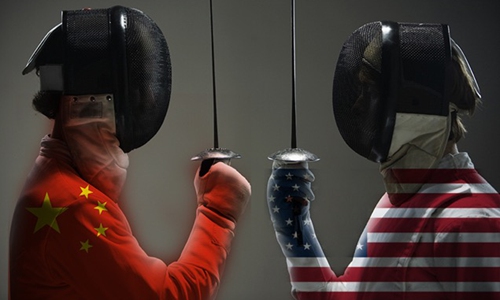China needs flexible approach as relations with US come to a crossroads
Source:Global Times Published: 2020/5/23 21:25:34

China US Photo: GT
Editor's Note:
As China-US tensions heighten alongside the coronavirus pandemic, a report to US Congress released by the White House on Wednesday lays out the Trump administration's approach for China. The report, titled "United States Strategic Approach to The People's Republic of China", claims that previous hopes for a "fundamental economic and political opening" in China have failed and calls for the continuation of a whole-of-government approach toward China. How to interpret US strategic intentions behind the report? How should China cope with competitive or even hostile relations with the US? The Global Times talked with two experts to gain their opinions.
Wei Zongyou, a professor at the Center for American Studies, Fudan University
The report is filled with a sheer hegemonic mentality and every single sentence aims to protect US national interests. The US became a global hegemon after World War II and has always hoped to change the world in accordance with its own will. It is the same approach with which it deals with China.
The US believes that it helped China enter the US-dominated international order, revitalize the Chinese economy and enter the World Trade Organization. However, China did not develop as the US wished - becoming politically free, democratic and economically market-oriented. In diplomacy, the US believes China has abandoned its past principle of keeping a low profile and turned a rather aggressive style that could challenge its dominance in the Asia-Pacific region and beyond. For the US, the conditions of the China engagement policy the US adopted 40 years ago don't exist anymore. When calculating its interests, the US would never take China's history and domestic conditions into consideration.
Reading through the newly released report, we can sense the US' toughness and even menace. But we can also see that the US has an explicit stance in matters of principle. Despite all of its provocative actions on Taiwan, the report states that the US "will continue to maintain strong unofficial relations with Taiwan in accordance with our 'One China' policy, based on the Taiwan Relations Act and the three United States-PRC Joint Communiques."
It is worth noting that the report was released against the backdrop of the ongoing COVID-19 pandemic. The US and China have not cooperated on this common human enemy. Rather, the pandemic has become a catalyst for the worsening strategic competition between the two major powers. The US has mounted its strategic guard against China, and China-US relations have come to a crossroads.
Against such a backdrop, China must hold its strategic resolve and vision and adopt flexible approaches. For instance, China does not need to care too much about what Trump says on Twitter or what US Secretary of State Mike Pompeo utters. Some US hawks, including Pompeo and Peter Navarro, only want to see Beijing and Washington walk toward confrontation without a way back, or a China that replicates the path of the former Soviet Union. With strong personal prejudices, they just want to bring bilateral relations into a cold war, no matter via exacerbating public opinion or policymaking. Trump also hopes to add to his bargaining chips by exploiting these hawkish forces.
A cooperative China-US relationship sees mutual benefit while confrontation hurts both. As long as the US abandons its stereotypical mind-set regarding China and views China's development rationally, there is room for cooperation on regional and world matters. The future trajectory of China-US relations depends on how the two interact rather than the US one-sidedly. China can still seek strategic initiatives.
Zhang Tengjun, an assistant research fellow at the China Institute of International Studies
Now that it's the 21st century, and the world is so diverse that it is supposed to tolerate different social systems, the US continuously lives in the past century and what is on its mind is cold war-like confrontation and bending other countries to its will, typical of US hegemony.
The US' manic actions toward China is a response to its own decline of strength and influence. It is also out of anxiety and fear that its leadership will be taken over by another country. In the past couple of decades, the US has headed for a "hollow" economy and its governance woes have been prominent, especially during the pandemic.
With accumulating domestic problems, the US is not confident in its own development. In the face of a rising power such as China, it feels challenged. For example, the US concerns about the China-proposed Belt and Road Initiative are merely out of concerns for its own economic power.
China-US relations have entered their darkest phase since the normalization of ties. Right now, they are rivals in almost all spectrums, and the gap is widening. This doesn't only come from changes in its power structure, but also from a negative strategic understanding of each other. The Thuscydides Trap is becoming a reality.
What should China do? China must have a clear understanding of what China-US ties serve for its own development. A stable China-US relationship is an important goal of China's major power diplomacy. This is not to cater to the US, but to create a favorable external environment for China's peaceful development.
Posted in: VIEWPOINT